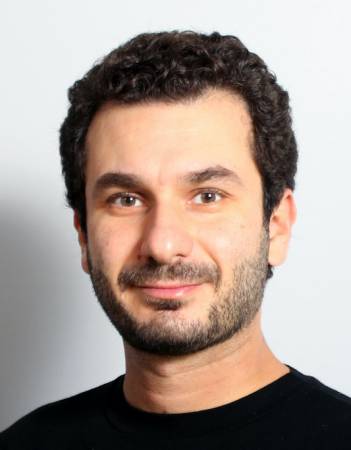Model Adaptation for Compliant Parallel Robot with Nonstationary Dynamics
Abstract: Soft robots can be constructed with few parts and from a wide variety of materials. This makes them a potentially appealing choice for applications where there are resource constraints on system fabrication. However, soft robot dynamics are difficult to accurately model analytically, due to a multiphysics coupling between shape, forces, temperature, and history of [...]
Adaptive Safety Margins for Safe Replanning under Time-Varying Disturbances
Abstract: Safe real-time navigation is a considerable challenge because engineers often need to work with uncertain vehicle dynamics, variable external disturbances, and imperfect controllers. A common strategy used to address safety is to employ hand-defined margins for obstacle inflation. However, arbitrary static margins often fail in more dynamic scenarios, and using worst-case assumptions proves to [...]
HyperDynamics: Generating Expert Dynamics Models by Observation
Abstract: We propose HyperDynamics, a framework that conditions on an agent’s interactions with the environment and optionally its visual observations, and generates the parameters of neural dynamics models based on inferred properties of the dynamical system. Physical and visual properties of the environment that are not part of the low-dimensional state yet affect its temporal [...]
Direct Fitting of Mixture Models
Abstract: There exist many choices of 3D shape representation. Some recent work has advocated for the use of Gaussian Mixture Models as a compact representation for 3D shapes and scenes. These models are typically fit to point clouds, even when the shapes were obtained as 3D meshes. Here we present a formulation for fitting Gaussian [...]
Terrain Perception using Structured Light for Micro-Rovers
Abstract: With continuing advancement in technology, the future of planetary exploration is likely to be dominated by robotic missions. Yet rovers capable of science investigations are slow and bulky with very limited computing which prohibits demonstrating full autonomy. These rovers are also risk averse due to their huge mission cost. However there is a new [...]
Photorealistic Reconstruction of Landmarks and People using Implicit Scene Representation
Abstract: Reconstructing scenes to synthesize novel views is a long standing problem in Computer Vision and Graphics. Recently, implicit scene representations have shown novel view synthesis results of unprecedented quality, like the ones of Neural Radiance Fields (NeRF), which use the weights of a multi-layer perceptron to model the volumetric density and color of a [...]
Carnegie Mellon University
Bayesian Models for Science-Driven Robotic Exploration
Abstract: Planetary rovers have traversed many kilometers and made major scientific discoveries. However, they spend a considerable amount of time awaiting instructions from ground operators. The reason is that they are designed for automated science data collection, not for autonomous exploration. The exploration of more distant worlds with stronger communication constraints will require a new [...]
Carnegie Mellon University
Expressive Real-time Intersection Scheduling: New Methods for Adaptive Traffic Signal Control
Abstract: Traffic congestion is a widespread problem throughout global metropolitan areas. In this thesis, we consider methods to optimize the performance of traffic signals to reduce congestion. We begin by presenting Expressive Real-time Intersection Scheduling (ERIS), a schedule-driven intersection control strategy that runs independently on each intersection in a traffic network. For each intersection, ERIS [...]
Verification and Accreditation of Artificial Intelligence
Abstract: This work involves formally verifying a trained model's adherence to important design specifications for the purpose of model accreditation. Accreditation of a trained model requires enumeration of the explicit operational conditions under which the model is certified to meet all necessary specifications. By verifying model adherence to specifications set by developers, we increase the [...]
Carnegie Mellon University
Direct-drive Hands: Making Robot Hands Transparent and Reactive to Contacts
Abstract: Industrial manipulators and end-effectors are a vital driver of the automation revolution. These robot hands, designed to reject disturbances with stiffness and strength, are inferior to their human counterparts. Human hands are dexterous and nimble effectors capable of a variety of interactions with the environment. Through this thesis we wish to answer a question: [...]
Towards Discriminative and Domain-Invariant Feature Learning
Abstract: Deep neural networks have achieved great success in various visual applications, when trained with large amounts of labeled in-domain data. However, the networks usually suffer from a heavy performance drop on the data whose distribution is quite different from the training one. Domain adaptation methods aim to deal with such performance gap caused by [...]
Learning Efficient Visual Representation on Model, Data, Label and Beyond
Abstract: Efficient deep learning is a broad concept that we aim to learn compressed deep models and develop training algorithms to improve the efficiency of model representations, data and label utilization, etc. In recent years, deep neural networks have been recognized as one of the most effective techniques for many learning tasks, also, in the [...]
Self-supervised Learning and Generalization
Abstract: Contrastive self-supervised learning is a highly effective way of learning representations that are useful for, i.e. generalise, to a wide range of downstream vision tasks and datasets. In the first part of the talk, I will present MoCHi, our recently published contrastive self-supervised learning approach (NeurIPS 2020) that is able to learn transferable representations [...]
Carnegie Mellon University
Teleoperation via Intuition: Safe and Intent Oriented Navigation
Abstract: This thesis aims to enable seamless teleoperation of a mobile robot by a human operator, such that the robot navigates in unstructured environments following the operator’s intent intuitively, safely, and efficiently. The roles of the human and robot are disproportionate in traditional teleoperation: The human is responsible for most of the autonomy of the [...]
Enabling Robots to Cooperate & Compete: Distributed Optimization & Game Theoretic Methods for Multiple Interacting Robots
Abstract: For robots to effectively operate in our world, they must master the skills of dynamic interaction. Autonomous cars must safely negotiate their trajectories with other vehicles and pedestrians as they drive to their destinations. UAVs must avoid collisions with other aircraft, as well as dynamic obstacles on the ground. Disaster response robots must coordinate [...]
Learning to see from few labels
Abstract: Computer vision systems today exhibit a rich and accurate understanding of the visual world, but increasingly rely on learning on large labeled datasets to do so. This reliance on large labeled datasets is a problem especially when one considers difficult perception tasks, or novel domains where annotations might require effort or expertise. We thus [...]















